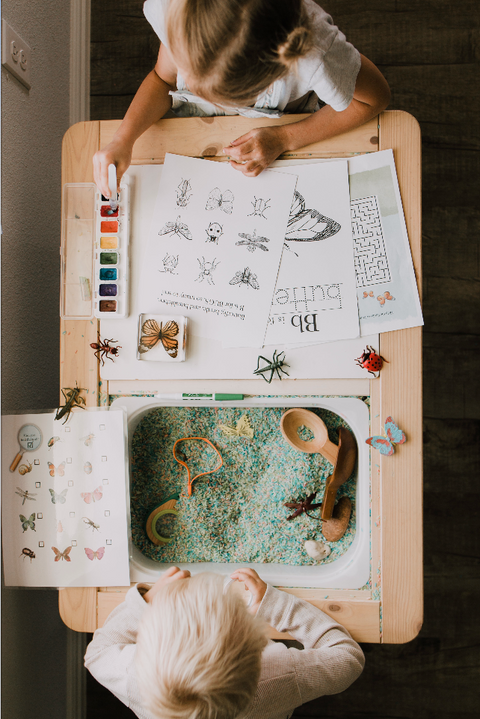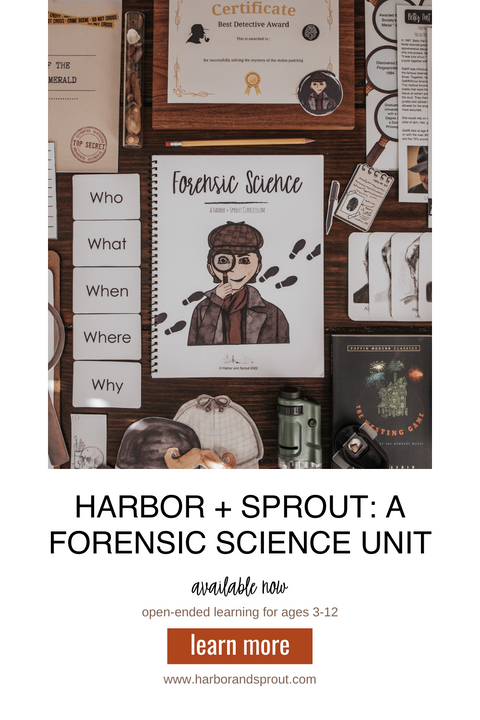
You have likely noticed certain methods of teaching and learning that are more effective and impactful for you or your children. There are so many ways to present and absorb information. When it comes to education and experiencing the world around us in a way that is most engaging, there is no simple one size fits all answer.
You may be familiar with the 7 distinct styles of learning, but you and your children almost certainly gravitate toward more than one in the ways you learn. We are able to take in the world around us best when we can experience it in ways that resonate with us. While every learner is different and living with their own set of unique circumstances, concepts such as learning styles may help provide insight and ideas to kickstart new doors opening in the minds you're nurturing each day.
Let's take a look at the 7 styles of learning, explore what each style entails, and learn about how Harbor + Sprout appeals to learners of each style. Be sure to take our quiz to find out what styles may best capture the mind of your child (and you)!
The 7 Styles of Learning
1. Visual/Spatial
Visual learners prefer to see and observe in order to internalize concepts. Visual aids such as diagrams, pictures, maps, and graphs help them best understand and retain information. They enjoy colors and symbols, and often draw or doodle as they listen or learn. Visual learners may be prone to daydreaming. Strengths of visual learners often include the ability to visualize and recall information, a strong sense of direction, artistic skills, and the ability to perceive nuances of body language and physical changes around them.
Harbor + Sprout is an excellent fit for visual learners because it is full of original artwork, visually striking, and offers many opportunities to view videos, art, and color or draw as part of lessons. You will often find that idea expression activities offer both writing lines and drawing space so that your child may respond in a way that they are best able to communicate.

2. Auditory/Aural/Auditory-Musical
Auditory learners process and remember information best when they hear it. Auditory learners tend to be good listeners and glean information through podcasts, lectures, and discussions. They are often musically inclined with a good sense of rhythm and pitch. They may benefit from activities such as discussing or explaining new ideas, which prompts two-way conversation that they can listen to and participate in.
Harbor + Sprout is a wonderful choice for auditory learners as our lessons frequently offer the opportunity to listen to books and information read aloud. Our music lessons are especially well suited for auditory learners as they allow for ample listening options and exposure to engaging sounds. Discussion is often encouraged throughout the curriculum and may help your child hear new and helpful ideas as they sort out their own.
3. Verbal/Linguistic
Verbal learners internalize best when they are able to read or write information. Tools like rhymes, acronyms, mnemonic devices, and word games are valuable techniques for linguistic learners. They tend to enjoy reading and writing and are skilled at expressing themselves. Verbal learners are usually able to learn new words easily and may excel in learning new languages. Discussing what they have learned and read are enjoyable activities for linguistic learners.
Harbor + Sprout offers an extensive linguistic section with our Language Arts lessons, Writing section, and the vocabulary/spelling section of the supplement. We also have a heavy focus on incorporating books and written responses. Your child will have the opportunity to experience language in many ways through our curriculum, and will even enjoy a foreign language element within the supplement.

4. Kinesthetic/Physical
Kinesthetic learners are most engaged when they are able to move and involve their bodies in their education. Hands-on activities, manipulatives, movement breaks, and tinkering are especially valuable for kinesthetic learners. Encouraging muscle memory is an excellent tactic for these learners. Strengths of kinesthetic learners may include excellent coordination, strong motor skills and athletic ability, and plenty of energy.
Harbor + Sprout has been developed by mothers who know children need to move in order to learn. Whether it's dancing to music, playing a roll-the-dice game, or building a model with clay, you will find tactile activities at every turn and in nearly every lesson. We believe that engaging the whole body in the learning experience helps bring education to life.
5. Logical/Mathematical
Logical learners are what you may consider mathematically minded. They operate best when given procedures to follow and if they are able to plan and organize. Logical learners are a curious bunch who recognize patterns easily, think scientifically, and are able to connect logical concepts and structures. They are goal-oriented, enjoy puzzles, and generally prefer visuals over words. They often categorize information and are adept at numbers and statistics.
Harbor + Sprout employs charts, graphs, and other methods of information organization to enable children who are logically minded to connect with their lessons. The math section provides enjoyable activities that will resonate well with your child and their needs. With our planning pages and spelled out lesson plans, your child will know what to expect from their schooling each day and will be able to plan ahead. Patterns, statistics, and opportunities to logically think through concepts abound in our curriculum.

6. Social/Interpersonal
Social learners enjoy working with groups and interacting with others to help them learn. Interpersonally inclined learners are skilled at communication (both verbal and non-verbal), listening, and collaboration. They may be drawn to study groups or buddy quizzes. They are generally empathetic and sensitive in nature with the ability to be thoughtful and understanding. Social learners may enjoy large groups of people, social activities, and tend to make strong natural leaders.
Harbor + Sprout lessons are specifically designed to be completed effectively either alone or in a group setting. You will find ample opportunities to collaborate, discuss, and share information, ideas, and creative projects. Regardless of whether your children are building a model together, playing a game, or quizzing one another with flash cards, there are many social opportunities in every lesson.
7. Solitary/Intrapersonal
Solitary learners are highly independent and enjoy studying and working alone. Tools such as journaling and independent reading may be excellent ways to engage a solitary learner. They work best in a quiet environment where they can focus without distractions. Intrapersonal learners are usually self-aware and in tune with their own thoughts and feelings. They may be reserved in opening up to others and careful about whom they share their inner selves with. Solitary learners are excellent at self-management and enjoy setting goals.
Harbor + Sprout lessons are full of opportunities to assign solitary reading, writing, reports, and deeper research. You will find ways to help your child deepen their learning independently in nearly every lesson. Many activities that can be completed in a group are also just as effective alone and in a quiet setting that will resonate best with your child. They will discover endless ways to take the lead on their own learning run with new ideas in their own ways.
How can this information help me teach my child?
Employing tools and aides in learning is sometimes frowned upon in the educational world, but the more we know about what our children need to learn, the better we can reach them! Don't be afraid to use items and techniques that speak to your child's learning strengths in order to help them internalize concepts. Perhaps they are most able to complete math lessons with the help of an abacus, or maybe they hum while they draw or write. The beauty of homeschool is that with the small group sizes and flexibility, children can engage all the senses they need to bring learning to life! Get loud, get messy, or create a safe and quiet haven for silent learning. You know your child and their needs best!
Remember, you can take the quiz as many times as you need for each member of your family and even for yourself! Use this information to help you consider what activities and tools may work best for your learners.
There is no right or wrong way to learn and experience the world. Above all, we hope that education is an experience that broadens horizons and helps you connect with your child or children. It is our goal here at Harbor + Sprout to ensure that each lesson appeals to all styles of learning and can be adapted to suit your child's needs. We are so glad to be learning along with you.
-The Harbor + Sprout Team




Comments (0)
There are no comments for this article. Be the first one to leave a message!